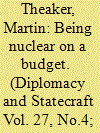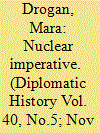| Srl | Item |
| 1 |
ID:
150076


|
|
|
|
|
| Summary/Abstract |
This analysis critiques the impact of President Dwight Eisenhower’s 1953 “Atoms for Peace” initiative on Washington’s alliance with Britain, itself a newly crowned nuclear state. Prime Minister Winston Churchill’s taste for personal diplomacy led him to support his friend’s proposal without real consideration for how the contributions of fissionable materials and manpower demanded by the scheme would damage Britain’s overstretched domestic nuclear project. Membership of an international atomic agency allowed Britain to reaffirm its global status whilst depleting the resources needed to develop its native technology. In turn, the article discusses the commercial challenge posed by American nuclear firms and highlights how reactor exports quickly became a contest between the quality of British research and the quantity of American subsidies. In this way, it establishes how “Atoms for Peace” prejudiced both Britain’s domestic nuclear effort and export potential, in turn shedding light on Washington’s relations with an ailing Great Power.
|
|
|
|
|
|
|
|
|
|
|
|
|
|
|
|
| 2 |
ID:
141685


|
|
|
|
|
| Summary/Abstract |
On August 27, the International Atomic Energy Agency (IAEA) and Kazakhstan signed an agreement establishing a fuel bank of low-enriched uranium (LEU).
|
|
|
|
|
|
|
|
|
|
|
|
|
|
|
|
| 3 |
ID:
148175


|
|
|
|
|
| Summary/Abstract |
In December 1953, President Dwight D. Eisenhower gave speech, soon known as “Atoms for Peace,” before the United Nations in which he promised to share non-military nuclear technology with the nations of the world. Very few members of his administration were aware of the proposal before it was made and in the months after the speech was given, they debated its intention and its implications for policy. This article examines the process by which members of the National Security Council, the State Department, and the Atomic Energy Commission devised a policy to put Eisenhower’s promises into practice. Intelligence reports, NSC debates, and policy drafts reveal that although members of the Eisenhower Administration believed that nuclear power was neither economical nor ready for export and represented a serious proliferation risk, they were convinced that the international political landscape left them no choice but to proceed with the sharing of technology worldwide.
|
|
|
|
|
|
|
|
|
|
|
|
|
|
|
|
| 4 |
ID:
076714


|
|
|
|
|
| Publication |
2006.
|
| Summary/Abstract |
South Africa's transition away from being a U.S. ally toward being a neutral country was followed by the development and then rollback of a nuclear weapons program. In South Africa's case, paranoia that the United States was abandoning it was a significant motive for going nuclear. Realism does not fully explain South Africa's desire for nuclear weapons, since the country faced no major strategic threats. Paranoia about communists and the loss of the United States as a major ally increased South Africa's sense of insecurity, thus it began to develop weapons and missiles. U.S. pressure increased in the late 1980s, and in 1989 the apartheid government began the process of surrendering power. South Africa signed the NPT, and in 1990 and 1991, it unilaterally disarmed. Lessons from the South Africa case include the critical role played by leaders in setting the direction of a country's strategic policy, and the unintended consequences of Western programs to promote peaceful energy. Democratic reforms may prove to be a successful long-term factor in reversing the development of nuclear weapons.
|
|
|
|
|
|
|
|
|
|
|
|
|
|
|
|
| 5 |
ID:
170615


|
|
|